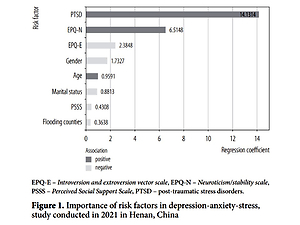Online first
Current issue
Archive
Most cited in 2024
About the Journal
Editorial Office
Editorial Board
Copyright and self-archiving policy
Information clause on the processing of personal data
Declaration of accessibility
Instructions for Authors
Instructions for Reviewers
Contact
Reviewers
2024
2023
2022
2020
2021
2019
2018
2017
2016
2015
2014
2013
Editing and translations
ORIGINAL PAPER
Personality modifies the effect of post-traumatic stress disorder (PTSD) and society support on depression-anxiety-stress in the residents undergone catastrophic flooding in Henan, China
1
Xinyang Vocational and Technical College, Xinyang, Henan, China (School of Medicine)
2
Yale University, New Haven, CT, USA (Department of Chronic Disease Epidemiology, Yale School of Public Health, School of Medicine)
3
Zhengzhou Normal University, Zhengzhou, Henan, China (School of Mathematics and Statistics)
Online publication date: 2022-07-04
Corresponding author
Med Pr Work Health Saf. 2022;73(4):305-14
KEYWORDS
TOPICS
ABSTRACT
Background: To analyze the impact of the flood disasters, social support and personality on the mental health of residents in Henan Province, China, providing fundamental knowledges for making measuring strategies to improve the psychological protection and anti-stress ability of the residents after the disaster. Material and Methods: A cross-section study was conducted via an online survey platform “questionnaire star,” which included 572 residents in Henan Province, which underwent the history of ever flood disaster on July 20. The questionnaires of Impact of Event Scale-Revised Edition (IES-R), Perceived Social Support Scale (PSSS), the Depression Anxiety Stress Scales (DASS-21) and the scales of Eysenck Personality Questionnaire-Revised (EPQ-R) version in Chinese were also administered to each participant. Generalized linear regression model was performed. Results: The residents who live in the flooding areas, are male and married had a significantly higher post-traumatic stress disorder (PTSD) score than their counterparts. The scores of depression-anxiety-stress in the residents with stable emotion were significantly lower than those with unstable emotion (p < 0.001). Machine learning showed that PTSD ranked the top risk factor, followed by neuroticism for Depression-Anxiety-Stress after disaster. The PTSD was negatively correlated with social support (p < 0.01), while it was positively correlated with depression-anxiety-stress and emotional stability (p < 0.01). There was a statistically significant interaction between PTSD, social support and neuroticism on depression-anxiety-stress (p < 0.001), with an independent effect of 1.4% on depression-anxiety-stress. Emotional stability showed the largest association with depression-anxiety-stress. Conclusions: Residents living in the catastrophic flooding areas had significant post-traumatic mental health issues, and the severity of mental problems was differently affected by post-traumatic stress disorder and social support in individuals with different personalities. Introvert and PTSD were the major risk factors for depression-anxiety-stress after the disaster. Med Pr. 2022;73(4):305–14
Share
RELATED ARTICLE
We process personal data collected when visiting the website. The function of obtaining information about users and their behavior is carried out by voluntarily entered information in forms and saving cookies in end devices. Data, including cookies, are used to provide services, improve the user experience and to analyze the traffic in accordance with the Privacy policy. Data are also collected and processed by Google Analytics tool (more).
You can change cookies settings in your browser. Restricted use of cookies in the browser configuration may affect some functionalities of the website.
You can change cookies settings in your browser. Restricted use of cookies in the browser configuration may affect some functionalities of the website.






